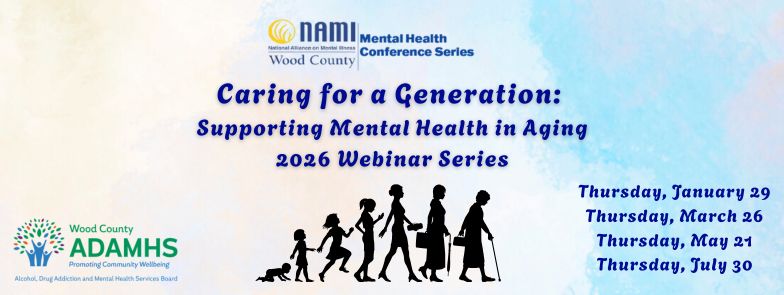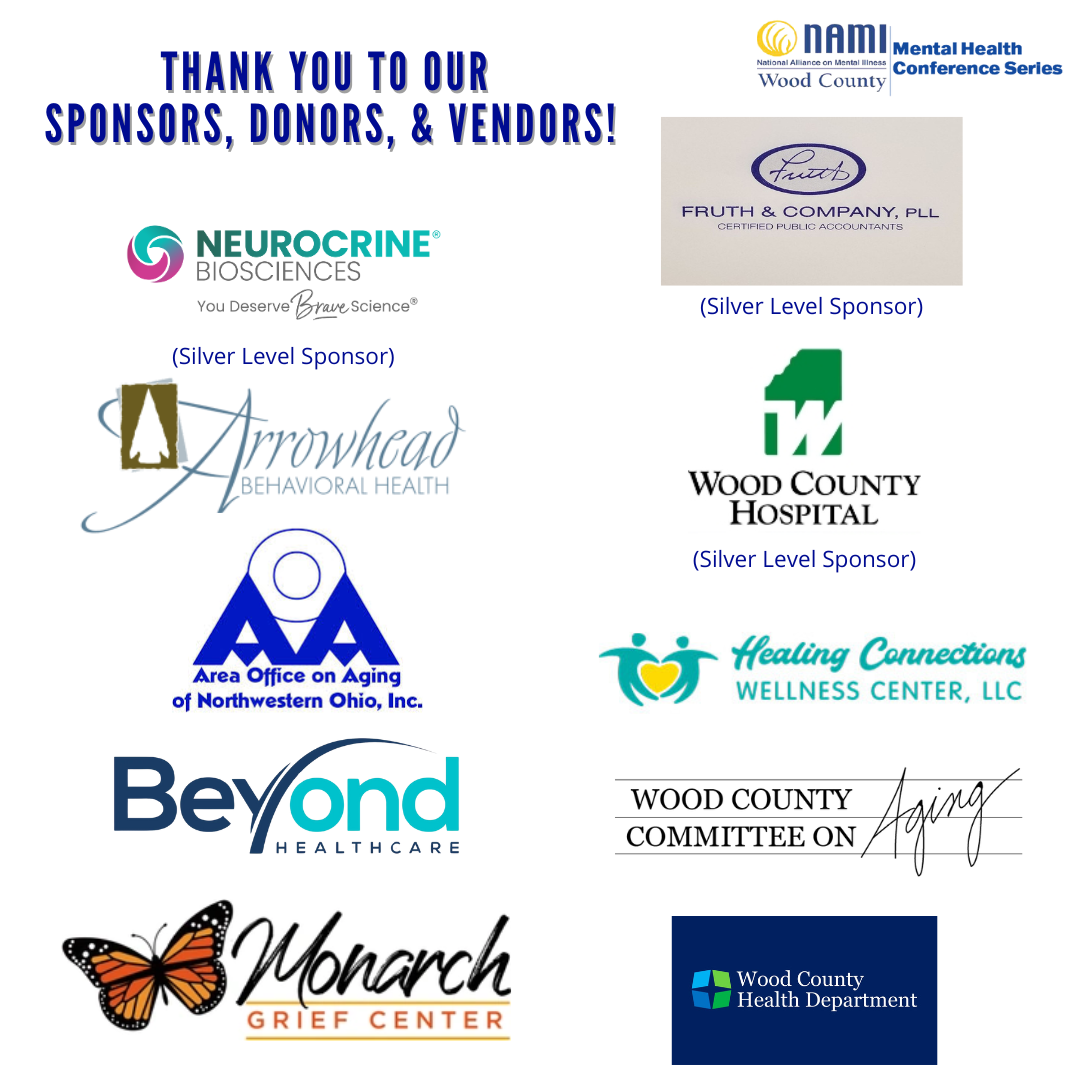
How Can We Support Our Clients and Loved Ones As They Age?
Mental health will affect all aspects of the lifespan. However, the mental health of older adults is often overlooked, and can even go undiagnosed, leading to more mental health crises. Join this year's conversation (virtually!) as we learn about addressing common aging stereotypes, handling changes/transitions as we age, navigating grief and loss, and other relevant topics.
In an expansion of last year's conference, NAMI Wood County's Mental Health Conference Series will explore the "Caring for a Generation: Supporting Mental Health in Aging" with a Webinar Series. We will be bringing in presenters from local mental health providers, university faculty, and more! This event is open to both mental health professionals and community members who wish to learn more about this topic.
-
Thursday, January 29, 2026: "Navigating Grief in Aging"
-
Thursday, March 26, 2026: "Breaking the Stigma of Aging"
-
Thursday, May 21, 2026: "The Role of Occupational Therapy in Mental Health Care for Older Adults: A Collaborative Approach"
-
Thursday, July 30, 2026: "Cognitive Disorders in Older Adults"
Cost for to attend (1) one webinar is $20. You can also buy all (4) four webinars for $40.
1 Continuing Education Units approved by the Ohio Counselor, Social Worker and Marriage & Family Therapist Board per webinar (January, March, May, and July).
Pending Continuing Education Units by the Ohio Chemical Dependency Professionals Board for March, May, and July webinars (see webinar description for more details).
Webinar Descriptions
"Navigating Grief in Aging" by Maren Simon, MSW, LISW-S, ACHPSW, FT
Thursday, January 29, 2026 | 11:30 - 12:30pm
Maren Simon, LISW-S from Monarch Grief, will delve into the complex experience of grief in older adults, focusing on how to identify the symptoms of prolonged grief and the emotional challenges that accompany aging. Attendees will explore various types of loss—such as the death of a loved one, health changes, and loss of independence—and how each can uniquely affect the aging process. The presentation will offer practical skills for supporting loved ones or clients who are grieving, equipping participants with strategies for providing empathetic care and fostering emotional resilience. Additionally, the session will highlight effective coping strategies in bereavement, helping individuals navigate grief in healthy and constructive ways. Whether as professionals or family members, participants will gain valuable tools to enhance their understanding of grief and provide meaningful support to those in need.
1 Continuing Education Unit approved by the Ohio Counselor, Social Worker and Marriage & Family Therapist Board
0.75 Continuing Education Units approved* by the Ohio Chemical Dependency Professionals Board:
*Domains include: PR1 for Certified Prevention Specialist Assistant, Certified Prevention Specialist and Certified Prevention Consultant. TR1 for Chemical Dependency Counselor Assistant, Licensed Chemical Dependency Counselor II, and Licensed Chemical Dependency Counselor III.
"Breaking the Stigma of Aging" by Nancy Orel, Ph.D., LPC
Thursday, March 26, 2026 | 11:30 - 12:30pm
Dr. Orel of Bowling Green State University will address the complex relationship between the aging process and mental health, shedding light on how physical changes can affect emotional and cognitive well-being. Attendees will explore common stereotypes about aging and understand how these misconceptions can influence health outcomes and interpersonal relationships. The keynote presentation will also offer practical strategies for addressing and challenging age-related stereotypes when interacting with clients and families. We will discuss key life transitions—such as retirement, empty nest syndrome, and other significant changes—and their impact on mental health. Additionally, the keynote speaker will emphasize the importance of language in fostering respect and dignity, exploring why terms like “older adult” are preferred over “elderly.” Participants will walk away with enhanced skills to work effectively with older adults, both as professionals and family members, while promoting a more inclusive and supportive approach to aging.
"The Role of Occupational Therapy in Mental Health Care for Older Adults: A Collaborative Approach" by Carli DiMeo, OTD, OTR/L
Thursday, May 21, 2026 | 11:30 - 12:30pm
In this session, Carli Dimeo, OTD, OTR/L, will explore the vital intersection between Occupational Therapy (OT) and mental health care, with a specific focus on older adults. Attendees will gain an understanding of how OT plays a critical role in supporting mental health through activities like cognitive exercises and activities of daily living (ADLs). Through sensory integration, stress management techniques, cognitive rehabilitation, and life skills training, OT assists older adults in maintaining independence and improving quality of life. The presentation will also highlight the importance of collaborative practice, illustrating how Occupational Therapists work alongside other healthcare professionals to deliver holistic and effective care. Participants will leave with practical resources and strategies on how both individuals and clinicians can utilize OT to support treatment and recovery in older adults, promoting overall well-being and independence.
"Cognitive Disorders in Older Adults" by Candice Schmitt, MSW, LISW-S and Dr. Kononov
Thursday, July 30, 2026 | 11:30 - 12:30pm
This session, led by Candice Schmitt, MSW, LISW-S and Dr. Kononov from the University of Toledo Medical Center, will provide an in-depth exploration of cognitive disorders in older adults, focusing on both traditional and alternative treatment options. Attendees will gain a comprehensive understanding of common cognitive disorders such as dementia, Alzheimer's disease, and other age-related cognitive impairments. The presentation will highlight evidence-based treatment strategies, including pharmacological approaches and therapies tailored to support cognitive function. In addition, participants will learn about holistic and alternative treatments, such as mindfulness, nutritional support, and physical activity, that can complement traditional care. The session will also address the role of social workers in advocating for and implementing these treatments, providing practical insights for both clinicians and family members on how to improve quality of life for older adults living with cognitive challenges.


